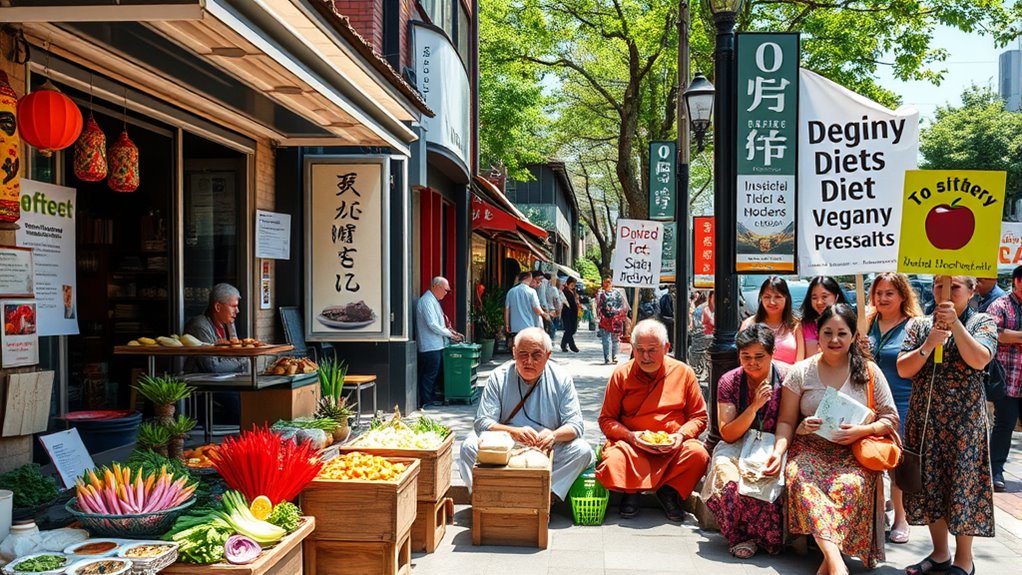Cultural traditions and religious beliefs considerably shape how people see and adopt veganism around the world. For example, Hinduism, Jainism, and Buddhism promote plant-based diets due to spiritual principles like non-violence and sacred animals. Meanwhile, regional food customs influence whether vegan options feel genuine or challenging. As societies modernize, these views evolve, blending tradition with new ideas. If you explore further, you’ll discover how cultural nuances create diverse perspectives on vegan lifestyles today.
Key Takeaways
- Religious dietary laws, such as Hinduism, Jainism, and Buddhism, promote vegetarian and vegan principles rooted in spiritual beliefs.
- Traditional food customs reflect regional histories and values, influencing the acceptance and adaptation of vegan diets.
- Cultural attitudes toward veganism evolve with modernization, globalization, and increased awareness of health and ethical concerns.
- Food practices embody community identity and beliefs, requiring respectful integration of vegan principles within diverse cultural contexts.
- Tailoring vegan approaches to align with cultural and religious traditions fosters respectful adoption and enhances acceptance worldwide.

Have you ever wondered how different cultures view veganism? It’s fascinating to see how deeply rooted beliefs and traditions influence what people eat and regard acceptable. In many societies, religious dietary laws play a significant role in shaping food choices, often dictating what’s permissible and what’s off-limits. For example, some religions have strict guidelines that exclude certain animal products, which can align with vegan principles or at least promote vegetarianism. In Hinduism, many followers avoid beef because of the sacred status of cows, while Jainism emphasizes non-violence and strict vegetarianism, which naturally aligns with vegan ideals. Similarly, Buddhism often encourages compassion for all living beings, leading many practitioners to adopt plant-based diets as part of their spiritual practice. These religious dietary laws are not just about health or ethics but are woven into the spiritual fabric of these communities, influencing their food customs profoundly.
Religious beliefs deeply influence food choices, promoting vegetarianism and vegan ideals across cultures and spiritual practices.
Regional food customs also shape how veganism is perceived and practiced. In some parts of the world, plant-based diets are traditional and deeply embedded in daily life, long before the modern vegan movement gained momentum. For instance, Mediterranean cuisine features an abundance of vegetables, legumes, and grains, making vegan options more accessible and culturally accepted. In contrast, in regions where meat consumption is a central part of social gatherings and cultural identity—like parts of South America or North America—adopting veganism might require more effort and cultural adaptation. These regional food customs often dictate the types of ingredients used and how meals are prepared, which influences whether vegan diets are seen as a feasible or respectful choice.
Moreover, cultural attitudes toward veganism can shift over time as societies modernize and globalize. What once was a foreign or even taboo diet in some areas may now be embraced or at least understood. For example, in East Asia, traditional vegetarian dishes have existed for centuries within Buddhist communities, but today, veganism is gaining popularity among younger generations seeking health benefits or ethical reasons. This evolution reflects a blending of traditional practices with contemporary values, showing how cultural understanding of food is dynamic. Understanding the cultural context also helps in appreciating the varying perceptions and acceptance of vegan diets across different societies.
Ultimately, whether driven by religious laws or regional customs, food choices are a reflection of a community’s history, beliefs, and identity. Recognizing these influences helps you appreciate the diversity of vegan perspectives worldwide. It’s not just about personal preference but about respecting the complex cultural fabric that shapes what people eat and why. Understanding this context makes it easier to see veganism not as a one-size-fits-all approach but as a flexible, culturally responsive way to consider compassion, health, and tradition.
Frequently Asked Questions
How Do Traditional Festivals Influence Vegan Practices?
Traditional festivals shape your vegan practices by incorporating festive rituals that emphasize plant-based foods, reinforcing cultural values. You might find that culinary heritage during these celebrations highlights vegan-friendly dishes, inspiring you to adopt or maintain plant-based eating habits. These festivities serve as a reminder of historical traditions and community bonds, encouraging you to embrace veganism as part of your cultural identity and ensuring sustainable, respectful food choices during special occasions.
Are There Specific Religious Vegan Dietary Restrictions?
Religious restrictions, like those in Jainism, Buddhism, and certain Hindu traditions, often promote veganism through spiritual principles. These religious dietary restrictions emphasize compassion, non-violence, and purity, aligning with vegan ideals. You might find that spiritual practices steer followers toward plant-based eating, fostering faith-based vegan lifestyles. By blending beliefs and dietary choices, these traditions demonstrate how spirituality and veganism intertwine, inspiring adherents to honor life and uphold ethical principles through their diet.
How Do Rural Communities Adapt to Veganism?
In rural communities, you often see adaptation to veganism through local farming practices and community resilience. Farmers might diversify crops to include plant-based foods, making vegan options more accessible. Community events and shared resources foster support, helping people progress smoothly. You notice that rural areas rely on traditional resilience, blending old practices with new dietary choices, ensuring everyone’s needs are met while respecting local culture and fostering sustainability.
What Are the Economic Impacts of Vegan Adoption?
When you adopt veganism, you contribute to economic growth by increasing demand for plant-based products. This dietary shift encourages farmers and companies to innovate, creating new markets and jobs. As more people choose vegan options, traditional meat and dairy industries may decline, but new opportunities emerge in plant-based food production, retail, and technology. Overall, your choice influences economic dynamics, promoting sustainable growth centered around changing consumer preferences.
How Does Veganism Affect Cultural Identity Preservation?
Veganism can be a double-edged sword for your cultural identity. It challenges cultural resistance by questioning traditional culinary heritage, like a storm threatening to wash away familiar roots. Yet, it can also inspire a reinterpretation of your food traditions, blending old flavors with new values. Embrace this transformation, and you’ll find your cultural identity evolving—stronger and more adaptable—like a tree shedding leaves but keeping its roots deep.
Conclusion
So, as you embrace veganism, remember that even the most traditional cultures are bending their rules—sometimes just to fit modern ideals. Ironically, what started as a rebellion against tradition might become the new tradition itself. You’re living proof that cultural perspectives aren’t fixed; they’re flexible, evolving with every choice you make. Who knew that in trying to preserve the old, you’d be shaping the new? Now, isn’t that a tasty irony?










